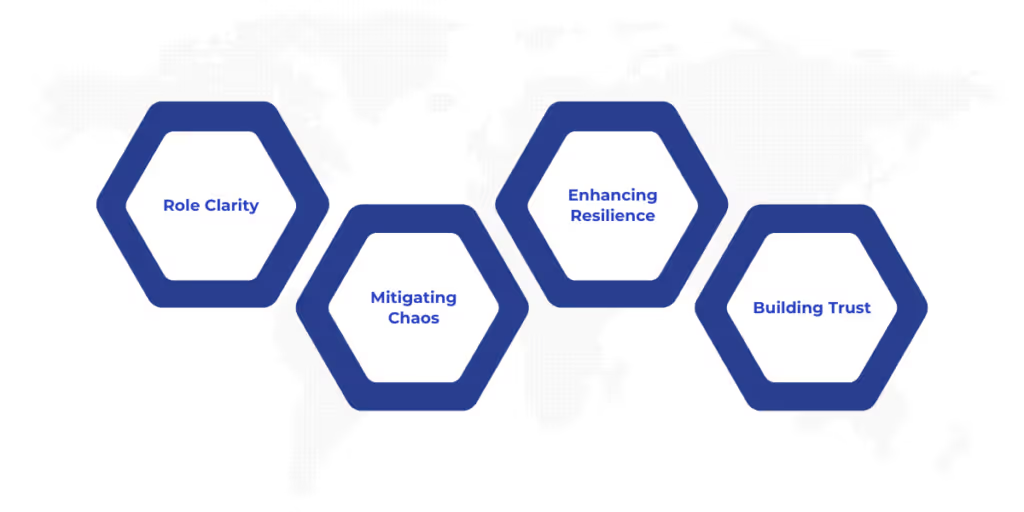
Transforming Response Strategies with Best Practices in Incident Management
Murthy S
2025-03-31

Talk to our cloud experts
Subject tags
Effective incident management is crucial in today’s digital environment, where cybersecurity threats are constant and evolving. Having a robust incident response strategy helps organizations manage unexpected events efficiently and minimize damage. A well-structured response can make all the difference in mitigating chaos, reducing delays, and fostering confidence in the response team. Additionally, prompt communication with stakeholders enhances trust and ensures the organization's resilience.
Organizations can react more effectively by maintaining a solid response strategy, build a proactive security posture, and improve their overall recovery process.
Key Benefits of Effective Incident Management

- Role Clarity: Establishes clear roles and responsibilities for each team member, minimizing confusion during an incident.
- Mitigating Chaos: A well-structured response plan eliminates disorder, reducing delays in responding to the incident.
- Enhancing Resilience: A comprehensive strategy helps staff feel confident in their ability to handle incidents and ensures that the organization is better prepared for future threats.
- Building Trust: Communicating quickly and transparently with customers enhances trust and loyalty, even during incidents.
Classification of Incidents
Classifying incidents based on their severity helps prioritize resources and manage incidents according to their potential impact on the organization. The severity of an incident dictates the urgency and type of response required, ensuring the right level of action is taken. Understanding the classification system allows teams to allocate resources efficiently and deal with each incident appropriately.
Different Levels of Severity
- Critical Incidents: These require immediate action and rapid response. For example, significant breaches or system outages that halt core services.
- Major Incidents: Important but not life-threatening. These require prompt resolution, but the situation may be managed more strategically.
- Moderate Incidents: These incidents disrupt operations but don’t require urgent attention. They can be resolved within a set period.
- Minor Incidents: Have minimal impact on business operations and are typically handled during routine maintenance.
- Low-Level Incidents: Incidents that pose little to no threat, often addressed in off-peak hours or as part of ongoing maintenance.
Best Practices for Responding to Incidents
A strong, well-defined response process is necessary for managing incidents efficiently. Best practices ensure that the team can respond quickly to critical issues, document their actions for future reference, and handle minor problems without excessive delays. Following these best practices ensures an effective, organized response, minimizing damage, and restoring normal operations quickly.
Immediate Response for Critical Issues
- Containment: Immediately isolate the incident to prevent it from spreading. This could involve disconnecting affected devices or systems.
- Communication: Alert all key stakeholders and provide regular updates regarding the status of the incident.
Resolution Processes for Major and Moderate Issues
- Major Incidents: These should be addressed quickly but carefully. A structured approach ensures resolution without unnecessary haste.
- Moderate Incidents: These typically involve more investigation. While less urgent, they must still be handled in a timely manner.
Documentation and Communication Strategies
- Document Every Step: Record every action taken to maintain an accurate log for future reference and audits.
- Regular Updates: Keep stakeholders and team members informed throughout the resolution process.
Long-Term Handling of Minor and Cosmetic Issues
- Prioritize Based on Impact: Minor issues should be handled after the more critical problems are resolved. They can often be scheduled for resolution at a later time.
Role of Incident Management Tools
Incident management tools play a crucial role in streamlining the process of responding to and resolving incidents. These tools are designed to improve communication, collaboration, and task tracking, ensuring the response is efficient. They also provide real-time visibility and help teams address incidents faster.
Facilitating Communication and Collaboration
Incident management tools provide a single platform for communication, ensuring all team members are on the same page. This eliminates confusion and allows for smoother coordination during incidents.
Tracking and Monitoring Incidents in Real Time
With tools that offer dashboards and alerts, teams can monitor incidents as they unfold, ensuring nothing is overlooked. Real-time updates also help prioritize tasks based on urgency.
Analyzing Incidents for Proactive Resolution
Incident management tools often feature built-in analytics that help teams learn from past incidents. By analyzing incident patterns, teams can adjust their strategies and prevent future occurrences.
Real-Time Updates Reducing Bottlenecks
Instant updates provided by these tools help reduce delays, ensuring that the team can take action as quickly as possible.
Benefits of Using Incident Management Tools
Using the right incident management tools offers numerous benefits, ranging from improved team efficiency to enhanced communication and reduced response times. These tools provide the visibility and structure necessary to resolve incidents quickly and effectively.
Improving Team Efficiency and Productivity
By automating task assignment and reminders, these tools allow teams to focus on resolution, increasing productivity.
Enhancing Communication and Reducing Confusion
With a centralized platform for incident communication, the team can avoid misunderstandings and ensure all parties are kept informed.
Providing Insights for Proactive Issue Resolution
Tools provide valuable insights from past incidents, helping teams prepare for future incidents and avoid common pitfalls.
Designing a Response Strategy with Best Practices
Designing an effective incident response strategy involves setting up processes and tools that streamline workflows, improve response times, and ensure the system can scale. Integrating the right tools and practices into the strategy will help teams manage incidents more effectively.
Automated Task Management and Tracking
Automating tasks ensures that no actions are missed and helps improve the efficiency of response efforts.
Integration with Existing Systems for Workflow Efficiency
By integrating incident management tools with existing security systems, businesses can improve workflow efficiency and ensure real-time data sharing.
Utilizing Real-Time Visibility Tools for Situational Awareness
Tools with real-time visibility allow teams to assess the current situation quickly, ensuring the right resources are deployed to the incident.
The Importance of Incident Response Drills
Incident response drills are essential to ensure that teams are prepared for real-world scenarios. These drills simulate security breaches and allow teams to practice their response protocols. Regular drills ensure that everyone knows their role, and that the organization’s incident response strategy is effective.
Key Benefits of Incident Response Drills
- Increased Team Readiness: Regular practice ensures all team members are familiar with their roles, which improves the speed and effectiveness of the response.
- Identifying Weaknesses: Drills help expose gaps in the existing strategy, allowing teams to address weaknesses before they impact real incidents.
- Boosting Confidence: Teams that regularly practice incident management are more confident in their ability to respond efficiently under pressure.
Conclusion
Incident management is critical for any organization’s cybersecurity strategy. By implementing best practices, utilizing effective tools, and continuously improving incident response protocols, businesses can enhance their ability to respond quickly and minimize the impact of incidents.
WaferWire is ready to help you optimize your incident management processes. Our expert team can guide you through implementing effective response strategies and the latest incident management tools to ensure your organization is prepared for any cyber threat.
Subscribe to Our Newsletter
Get instant updates in your email without missing any news

Copyright © 2025 WaferWire Cloud Technologies




.png)












